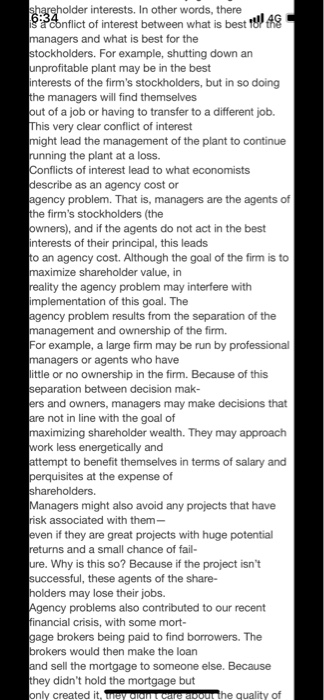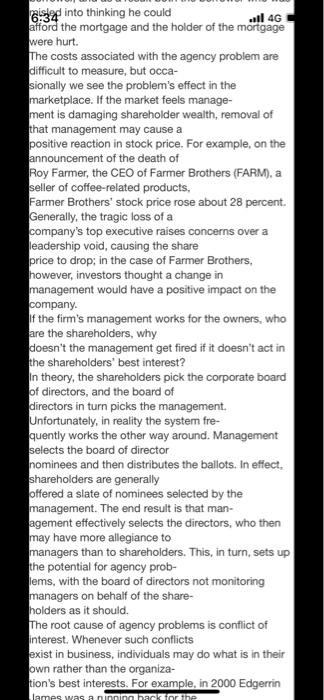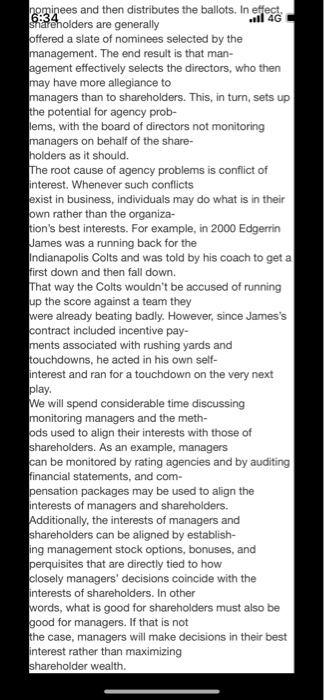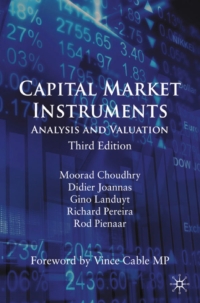please post your answer as photo that is not hand written
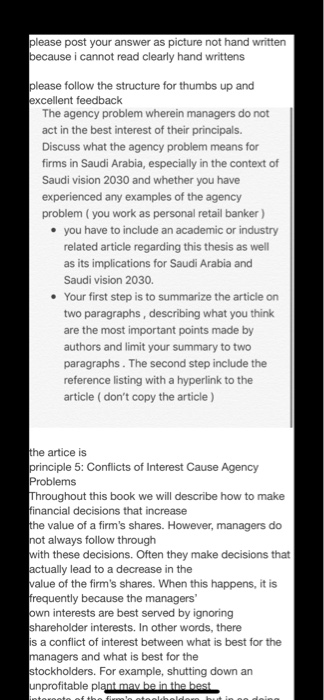
please post your answer as picture not hand written because i cannot read clearly hand writtens please follow the structure for thumbs up and excellent feedback The agency problem wherein managers do not act in the best interest of their principals. Discuss what the agency problem means for firms in Saudi Arabia, especially in the context of Saudi vision 2030 and whether you have experienced any examples of the agency problem (you work as personal retail banker) you have to include an academic or industry related article regarding this thesis as well as its implications for Saudi Arabia and Saudi vision 2030. Your first step is to summarize the article on two paragraphs, describing what you think are the most important points made by authors and limit your summary to two paragraphs. The second step include the reference listing with a hyperlink to the article ( don't copy the article) the artice is principle 5: Conflicts of Interest Cause Agency Problems Throughout this book we will describe how to make financial decisions that increase the value of a firm's shares. However, managers do not always follow through with these decisions. Often they make decisions that actually lead to a decrease in the value of the firm's shares. When this happens, it is frequently because the managers own interests are best served by ignoring shareholder interests. In other words, there is a conflict of interest between what is best for the managers and what is best for the stockholders. For example, shutting down an unprofitable plant may be in the best shareholder interests. In other words, there S onflict of interest between what is best 10 managers and what is best for the stockholders. For example, shutting down an unprofitable plant may be in the best interests of the firm's stockholders, but in so doing the managers will find themselves out of a job or having to transfer to a different job. This very clear conflict of interest might lead the management of the plant to continue running the plant at a loss. Conflicts of interest lead to what economists describe as an agency cost or agency problem. That is, managers are the agents of the firm's stockholders (the owners), and if the agents do not act in the best interests of their principal, this leads to an agency cost. Although the goal of the firm is to maximize shareholder value, in reality the agency problem may interfere with implementation of this goal. The agency problem results from the separation of the management and ownership of the firm. For example, a large firm may be run by professional managers or agents who have little or no ownership in the firm. Because of this separation between decision mak- ers and owners, managers may make decisions that are not in line with the goal of maximizing shareholder wealth. They may approach work less energetically and attempt to benefit themselves in terms of salary and perquisites at the expense of shareholders. Managers might also avoid any projects that have risk associated with them- even if they are great projects with huge potential returns and a small chance of fail- ure. Why is this so? Because if the project isn't successful, these agents of the share- holders may lose their jobs. Agency problems also contributed to our recent financial crisis, with some mort- gage brokers being paid to find borrowers. The brokers would then make the loan and sell the mortgage to someone else. Because they didn't hold the mortgage but only created it, they want care about the quality of Gislep into thinking he could Il 4G afford the mortgage and the holder of the mortgage were hurt. The costs associated with the agency problem are difficult to measure, but occa- sionally we see the problem's effect in the marketplace. If the market feels manage- ment is damaging shareholder wealth, removal of that management may cause a positive reaction in stock price. For example, on the announcement of the death of Roy Farmer, the CEO of Farmer Brothers (FARM), a seller of coffee-related products, Farmer Brothers' stock price rose about 28 percent. Generally, the tragic loss of a company's top executive raises concerns over a leadership void, causing the share price to drop; in the case of Farmer Brothers, however, investors thought a change in management would have a positive impact on the company. If the firm's management works for the owners, who are the shareholders, why doesn't the management get fired if it doesn't act in the shareholders' best interest? In theory, the shareholders pick the corporate board of directors, and the board of directors in turn picks the management. Unfortunately, in reality the system fre- quently works the other way around. Management selects the board of director nominees and then distributes the ballots. In effect, shareholders are generally offered a slate of nominees selected by the management. The end result is that man- agement effectively selects the directors, who then may have more allegiance to managers than to shareholders. This, in turn, sets up the potential for agency prob- lems, with the board of directors not monitoring managers on behalf of the share- holders as it should. The root cause of agency problems is conflict of interest. Whenever such conflicts exist in business, individuals may do what is in their own rather than the organiza- tion's best interests. For example, in 2000 Edgerrin Llames was a ninning hack for the nominees and then distributes the ballots. In effect. Saleholders are generally offered a slate of nominees selected by the management. The end result is that man- agement effectively selects the directors, who then may have more allegiance to managers than to shareholders. This, in turn, sets up the potential for agency prob- lems, with the board of directors not monitoring managers on behalf of the share- holders as it should. The root cause of agency problems is conflict of interest. Whenever such conflicts exist in business, individuals may do what is in their own rather than the organiza- tion's best interests. For example, in 2000 Edgerrin James was a running back for the Indianapolis Colts and was told by his coach to get a first down and then fall down. That way the Colts wouldn't be accused of running up the score against a team they were already beating badly. However, since James's contract included incentive pay- ments associated with rushing yards and touchdowns, he acted in his own self- interest and ran for a touchdown on the very next play. We will spend considerable time discussing monitoring managers and the meth- ods used to align their interests with those of shareholders. As an example, managers can be monitored by rating agencies and by auditing financial statements, and com- pensation packages may be used to align the interests of managers and shareholders. Additionally, the interests of managers and shareholders can be aligned by establish- ing management stock options, bonuses, and perquisites that are directly tied to how closely managers' decisions coincide with the interests of shareholders. In other words, what is good for shareholders must also be good for managers. If that is not the case, managers will make decisions in their best interest rather than maximizing shareholder wealth. please post your answer as picture not hand written because i cannot read clearly hand writtens please follow the structure for thumbs up and excellent feedback The agency problem wherein managers do not act in the best interest of their principals. Discuss what the agency problem means for firms in Saudi Arabia, especially in the context of Saudi vision 2030 and whether you have experienced any examples of the agency problem (you work as personal retail banker) you have to include an academic or industry related article regarding this thesis as well as its implications for Saudi Arabia and Saudi vision 2030. Your first step is to summarize the article on two paragraphs, describing what you think are the most important points made by authors and limit your summary to two paragraphs. The second step include the reference listing with a hyperlink to the article ( don't copy the article) the artice is principle 5: Conflicts of Interest Cause Agency Problems Throughout this book we will describe how to make financial decisions that increase the value of a firm's shares. However, managers do not always follow through with these decisions. Often they make decisions that actually lead to a decrease in the value of the firm's shares. When this happens, it is frequently because the managers own interests are best served by ignoring shareholder interests. In other words, there is a conflict of interest between what is best for the managers and what is best for the stockholders. For example, shutting down an unprofitable plant may be in the best shareholder interests. In other words, there S onflict of interest between what is best 10 managers and what is best for the stockholders. For example, shutting down an unprofitable plant may be in the best interests of the firm's stockholders, but in so doing the managers will find themselves out of a job or having to transfer to a different job. This very clear conflict of interest might lead the management of the plant to continue running the plant at a loss. Conflicts of interest lead to what economists describe as an agency cost or agency problem. That is, managers are the agents of the firm's stockholders (the owners), and if the agents do not act in the best interests of their principal, this leads to an agency cost. Although the goal of the firm is to maximize shareholder value, in reality the agency problem may interfere with implementation of this goal. The agency problem results from the separation of the management and ownership of the firm. For example, a large firm may be run by professional managers or agents who have little or no ownership in the firm. Because of this separation between decision mak- ers and owners, managers may make decisions that are not in line with the goal of maximizing shareholder wealth. They may approach work less energetically and attempt to benefit themselves in terms of salary and perquisites at the expense of shareholders. Managers might also avoid any projects that have risk associated with them- even if they are great projects with huge potential returns and a small chance of fail- ure. Why is this so? Because if the project isn't successful, these agents of the share- holders may lose their jobs. Agency problems also contributed to our recent financial crisis, with some mort- gage brokers being paid to find borrowers. The brokers would then make the loan and sell the mortgage to someone else. Because they didn't hold the mortgage but only created it, they want care about the quality of Gislep into thinking he could Il 4G afford the mortgage and the holder of the mortgage were hurt. The costs associated with the agency problem are difficult to measure, but occa- sionally we see the problem's effect in the marketplace. If the market feels manage- ment is damaging shareholder wealth, removal of that management may cause a positive reaction in stock price. For example, on the announcement of the death of Roy Farmer, the CEO of Farmer Brothers (FARM), a seller of coffee-related products, Farmer Brothers' stock price rose about 28 percent. Generally, the tragic loss of a company's top executive raises concerns over a leadership void, causing the share price to drop; in the case of Farmer Brothers, however, investors thought a change in management would have a positive impact on the company. If the firm's management works for the owners, who are the shareholders, why doesn't the management get fired if it doesn't act in the shareholders' best interest? In theory, the shareholders pick the corporate board of directors, and the board of directors in turn picks the management. Unfortunately, in reality the system fre- quently works the other way around. Management selects the board of director nominees and then distributes the ballots. In effect, shareholders are generally offered a slate of nominees selected by the management. The end result is that man- agement effectively selects the directors, who then may have more allegiance to managers than to shareholders. This, in turn, sets up the potential for agency prob- lems, with the board of directors not monitoring managers on behalf of the share- holders as it should. The root cause of agency problems is conflict of interest. Whenever such conflicts exist in business, individuals may do what is in their own rather than the organiza- tion's best interests. For example, in 2000 Edgerrin Llames was a ninning hack for the nominees and then distributes the ballots. In effect. Saleholders are generally offered a slate of nominees selected by the management. The end result is that man- agement effectively selects the directors, who then may have more allegiance to managers than to shareholders. This, in turn, sets up the potential for agency prob- lems, with the board of directors not monitoring managers on behalf of the share- holders as it should. The root cause of agency problems is conflict of interest. Whenever such conflicts exist in business, individuals may do what is in their own rather than the organiza- tion's best interests. For example, in 2000 Edgerrin James was a running back for the Indianapolis Colts and was told by his coach to get a first down and then fall down. That way the Colts wouldn't be accused of running up the score against a team they were already beating badly. However, since James's contract included incentive pay- ments associated with rushing yards and touchdowns, he acted in his own self- interest and ran for a touchdown on the very next play. We will spend considerable time discussing monitoring managers and the meth- ods used to align their interests with those of shareholders. As an example, managers can be monitored by rating agencies and by auditing financial statements, and com- pensation packages may be used to align the interests of managers and shareholders. Additionally, the interests of managers and shareholders can be aligned by establish- ing management stock options, bonuses, and perquisites that are directly tied to how closely managers' decisions coincide with the interests of shareholders. In other words, what is good for shareholders must also be good for managers. If that is not the case, managers will make decisions in their best interest rather than maximizing shareholder wealth


